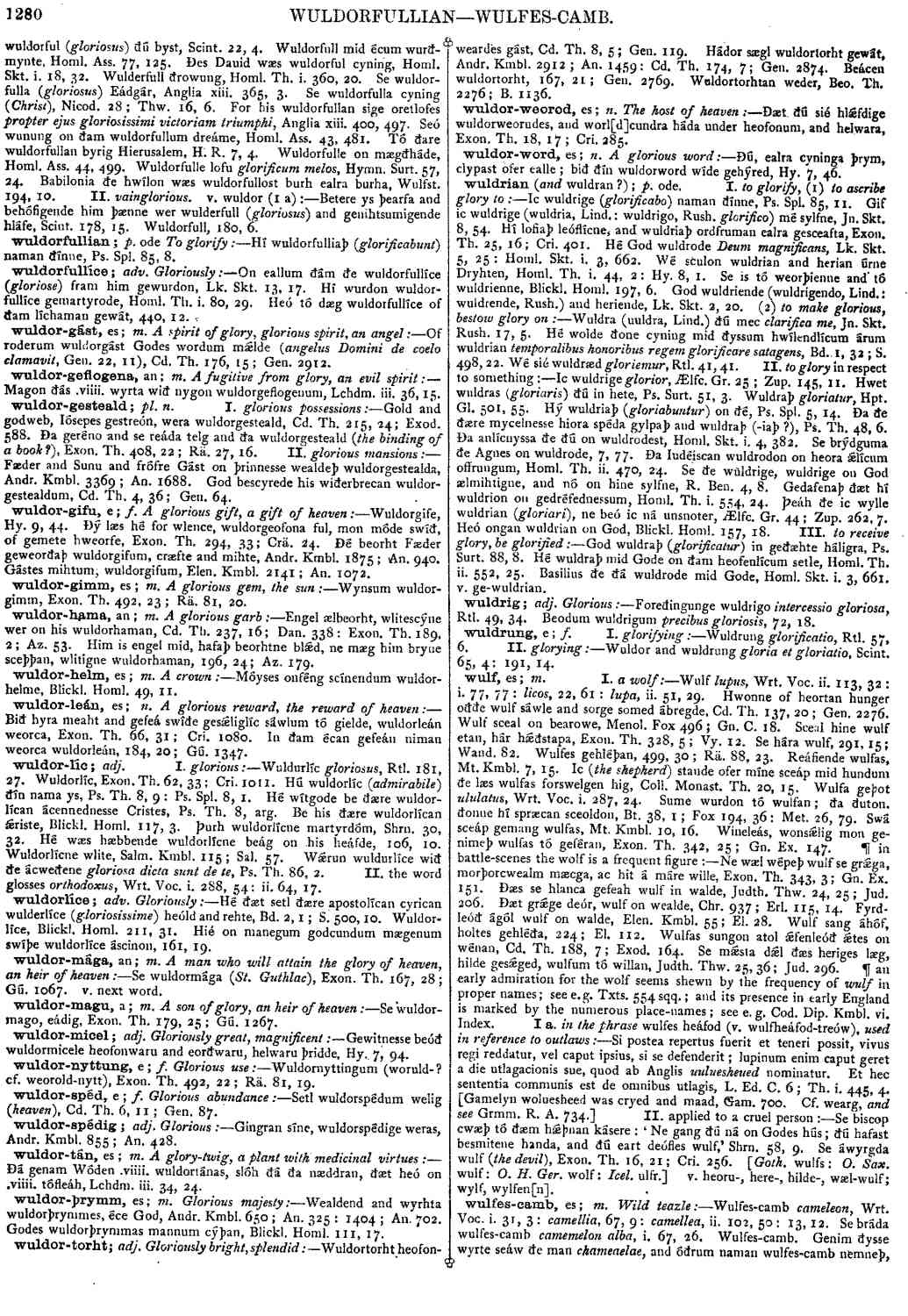wulf
- noun [ masculine ]
-
Wulf
lupus,
- Wrt. Voc. ii. 113, 32 :
- i. 77, 77:
licos,
- 22, 61:
lupa,
- ii. 51, 29.
-
Hwonne of heortan hunger oððe wulf sáwle and sorge somed ábregde,
- Cd. Th. 137, 20; Gen. 2276.
-
Wulf sceal on bearowe,
- Menol. Fox 496 ;
- Gn. C. 18.
-
Sceal hine wulf etan, hár hǽðstapa,
- Exon. Th. 328, 5 ;
- Vy. 12.
-
Se hára wulf,
- 291, 15 ;
- Wand. 82.
-
Wulfes gehléþan,
- 499, 30 ;
- Rä. 88, 23.
-
Reáfiende wulfas,
- Mt. Kmbl. 7, 15.
-
Ic (the shepherd) stande ofer míne sceáp mid hundum ðe læs wulfas forswelgen hig,
- Coll. Monast. Th. 20, 15.
-
Wulfa geþot
ululatus,
- Wrt. Voc. i. 287, 24.
-
Sume wurdon tó wulfan; ða ðuton ðonne hí spræcan sceoldon,
- Bt. 38, 1 ;
- Fox 194, 36 :
- Met. 26, 79.
-
Swá sceáp gemang wulfas,
- Mt. Kmbl. 10, 16.
-
Wineleás, wonsǽlig mon genimeþ wulfas tó geféran,
- Exon. Th. 342, 25 ;
- Gn. Ex. 147.
-
Ne wæl wépeþ wulf se grǽga, morþorcwealm mæcga, ac hit á máre wille,
- Exon. Th. 343, 3 ;
- Gn. Ex. 151.
-
Ðæs se hlanca gefeah wulf in walde,
- Judth. Thw. 24, 25 ;
- Jud. 206.
-
Ðæt grǽge deór, wulf on wealde,
- Chr. 937 ;
- Erl. 115, 14.
-
Fyrdleóð ágól wulf on walde,
- Elen. Kmbl. 55 ;
- El. 28.
-
Wulf sang áhóf, holtes gehléða,
- 224 ;
- El. 112.
-
Wulfas sungon atol ǽfenleóð ǽtes on wénan,
- Cd. Th. 188, 7 ;
- Exod. 164.
-
Se mǽsta dǽl ðæs heriges læg, hilde gesǽged, wulfum tó willan,
- Judth. Thw. 25, 36 ;
- Jud. 296.
-
Si postea repertus fuerit et teneri possit, vivus regi reddatur, vel caput ipsius, si se defenderit; lupinum enim caput geret a die utlagacionis sue, quod ab Anglis uuluesheuednominatur. Et hec sententia communis est de omnibus utlagis,
- L. Ed. C. 6 ;
- Th. i. 445. 4.
- Gam. 700.
- and see Grmm. R. A. 734.
-
Se biscop cwæþ tó ðæm hǽþnan kásere: 'Ne gang ðú ná on Godes hús; ðú hafast besmitene handa, and ðú eart deófles wulf,'
- Shrn. 58, 9.
-
Se áwyrgda wulf
(the devil),
- Exon. Th. 16, 21 ;
- Cri. 256.
Bosworth, Joseph. “wulf.” In An Anglo-Saxon Dictionary Online, edited by Thomas Northcote Toller, Christ Sean, and Ondřej Tichy. Prague: Faculty of Arts, Charles University, 2014. https://bosworthtoller.com/36812.
Checked: 1